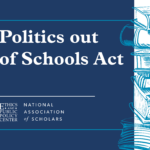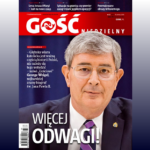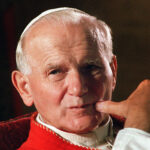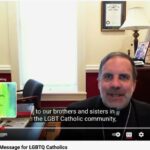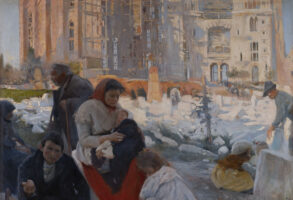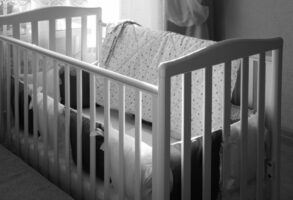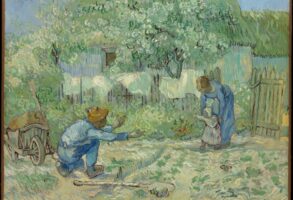
Published May 22, 2024
Rome. Age certainly accelerates one’s sense of the passage of time.
Well do I remember high school classes that felt as long as Würm Glaciation, the minute hand circumambulating the clock’s perimeter at a glacial pace. Yet this past April 27, sitting in the south transept of the world’s greatest tombstone—the Papal Basilica of St. Peter’s in the Vatican—I remembered being at that exact spot at the 1996 Mass marking John Paul II’s priestly golden jubilee, and the intervening decades seem to have passed at hypersonic speed. Tempus fugit, indeed!
It was the tenth anniversary of John Paul II’s canonization, so it was also unnerving to realize that a full decennium had gone by since the man whose biography I had written was raised to the glory of the altars in company with Pope John XXIII. There were murmurings, then, that Pope Francis had contrived a double-header canonization to dilute the focus on John Paul II. To my mind, though, it was vere dignum et iustum, “truly right and just,” that the two bookends of the Second Vatican Council—the pope who summoned the Council to re-energize the Church for evangelization and the pope who gave the Council its authoritative interpretation while calling us to live Vatican II’s teaching in the “New Evangelization”—should be canonized together.
Be that as it may, last month’s anniversary Mass was something of a grand recapitulation of the John Paul II years.
It was organized by John Paul’s longtime secretary and confidant, Stanisław Dziwisz, now the emeritus cardinal archbishop of Kraków. His episcopal motto, Sursum Corda (Lift Up Your Hearts), poignantly summarized the Polish pope’s electrifying impact on the world Church.
The principal celebrant was Cardinal Giovanni Battista Re, dean of the college of cardinals and longtime sostituto of the Secretariat of State under John Paul—in effect, the papal chief of staff. At ninety years old, Cardinal Re still exudes the incandescent energy he displayed as sostituto from 1989 until 2000—although, as I reminded him at the post-Mass reception in the atrium of the Paul VI Audience Hall, “You fell asleep on my shoulder during the premier of Our God’s Brother in Kraków in June 1997!”
And there, in the first row of concelebrants, was John Paul II’s great vicar for the Diocese of Rome, Cardinal Camillo Ruini: ninety-three and confined to a wheelchair, but determined to celebrate the sanctity of the man whose vision of a missionary, culture-reforming Church Ruini had worked heroically to bring to life in Rome and throughout Italy. What, I wondered (and not for the first time), would things have been like if Pope Benedict XVI had made Cardinal Ruini his Secretary of State?
One concelebrant’s presence raised eyebrows. Archbishop Vincenzo Paglia, then merely “Don Vincenzo,” was endlessly solicitous of John Paul II for twenty-six and a half years. Over the past decade, however, Paglia has systematically dismantled—some would say, demolished—one of the Polish pontiff’s signature initiatives: the John Paul II Institute on Marriage and the Family at the Pontifical Lateran University, which today bears only a nominal relationship to the vibrant intellectual center that Carlo Caffarra, Stanisław Grygiel, Livio Melina, José Granados, and other distinguished scholars once created (which likely explains why the institute has so few students today).
At the end of the Mass, the concelebrating cardinals and bishops laid a floral wreath on John Paul II’s tomb, between the chapel of Michelangelo’s Pietà and the basilica’s Blessed Sacrament chapel. They then led the congregation in a prayer composed for the occasion, which beautifully captured the Christ-centeredness of an epic pontificate and evoked some of its greatest concerns:
O Saint John Paul, from Heaven’s window give us your blessing! Bless the Church, which you loved so much and courageously served along the pathways of the world, to bring Jesus to everyone and everyone to Jesus. Let us hear again your powerful cry, “Open, open wide the doors to Christ!” Help us open the doors of our hearts to Jesus, so that we may be tireless missionaries of the Gospel today.
Bless the young, who were your great passion. . . . Bless the families, bless every family. You who felt Satan’s assault against this precious spark of Heaven that God kindled on earth, make us strong and courageous in defending the family . . .
Open new pathways to the Divine Mercy that Jesus made near to us in the Sacrament of Pardon, in the Most Holy Eucharist, and in the Charity that transforms us into a window of God’s Love. Amen.
St. John Paul II, pray for us.
George Weigel, Distinguished Senior Fellow of the Ethics and Public Policy Center, is a Catholic theologian and one of America’s leading public intellectuals. He holds EPPC’s William E. Simon Chair in Catholic Studies.
